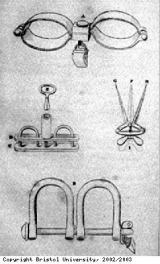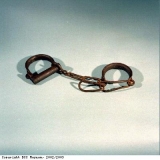How many people were taken from Africa?
How many Africans were taken from Africa through enslavement? There are no complete records and estimates vary from a few millions to 100,000,000 people. Most historians today think that, according to the shipping records available, between 9 and 11 million people were taken out of Africa by European slave traders and landed alive on the other side of the Atlantic. One researcher gives the higher, very detailed figure of 11,863,000. This detail from a picture of a Bristol slave ship, the Blandford, shows enslaved Africans being loaded onto a boat. Careful records were kept of all trade voyages, and from these records people can today work out fairly accurate figures for all types of trade. From how many barrels of wine were imported to Britain from France, to how many enslaved Africans were carried in British ships.
Many numbers were not recorded. Untold numbers of enslaved people died without ever reaching the Americas. They died at the hands of the African traders who took them from their homes in ‘slave raids’ in Africa. They also died on the forced march from their homes to the coast. People died awaiting sale in buildings, called slave forts, on the coast. Many died on board the ships that took them across the Atlantic Ocean, from Africa to the Americas. There are virtually no records for these aspects of the slave trade. It is possible that as many people died in Africa as were taken out of the country (estimated at between 9 and 11 million).
The lowest number for the total loss through the transatlantic slave trade could be about 20 million people. Higher figures have been suggested, but to date there is no conclusive evidence to support such estimates.
British ships carried about 2.8 million slaves altogether. Bristol traders were probably responsible for shipping over half a million enslaved Africans, about one-fifth of the total. This number seems comparatively small compared to Liverpool’s later record of 1.5 million. Between 1698 and 1807, the slave trade was open to all traders and merchants who wanted to take part. Before that it was restricted to one group of merchants in London, the Royal African Company. Bristol’s role in the early years of the trade, after 1698, established important trading connections which stimulated the growth of Britain’s trade in slaves.
There are few records for slave deaths at the West African coast. One record does refer to these deaths. The business papers of James Rogers, one of the biggest slave traders in the city, are preserved in the Public Record Office. These papers show that out of 939 slaves bought for Rogers during 1790, 203 died before they were put on board ship.





